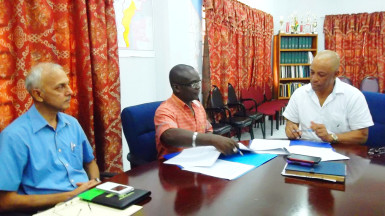The Ashmins Group of Companies yesterday signed an agreement with the Ministry of Commu-nities to construct a wastewater treatment plant with financing from a revolving fund set up to fund wastewater management projects in Guyana.
According to a Ministry of Communities statement, with the signing of the US$300,000 agreement, Ashmins is the first private sector company to access financing under the Guy-ana Wastewater Revolving Fund (GWRF), which was established in 2011.
The wastewater treatment plant will be constructed to treat 139,000 litres of wastewater daily, the ministry said, while noting that it will be used to divert and treat all wastewater generated at Ashmins’ Splashmins Fun Park and Resort and Madewini Villas. Treated wastewater will be reused for irrigation in vital operation across the sites, it added.
“This project will see 100 percent of wastewater generated by the company being treated to acceptable standards as outlined in the provisions of the LBS Protocol [Protocol Con-cerning Pollution from Land-Based Sources and Activities] before being discharged into the environment,” the statement said.
The signing ceremony was held at the Ministry of Communities at Kingston, where Minister Ronald Bulkan congratulated Ashmins’ Chief Executive Officer Lennox John for his pioneering vision of leading the way for best practices in the private sector, particularly the tourism industry.

Bulkan was reported as saying that as Guyana promotes tourism as part of its economic development, the implementation of international best practices with respect to the protection of the environment must be realised to attract and meet the demands of international tourists.
The Minister also said there needs to be a recognition of water as an important commodity, while noting that very little attention is paid in this area. He also pointed out that wastewater when treated could be reused for many purposes including agriculture.
According to the ministry statement, the project has helped John to achieve one of his dreams of assisting the country.
It said John related that he wants to be an example for other private sector companies to follow and his belief that the project would improve the standard of his operations and help the environment.
The ministry also noted that the Inter-American Development Bank (IDB) will be assisting with the implementation of the project.
With assistance from the Global Environment Faci-lity (GEF), and in collaboration with the Inter-American Development Bank and the United Nations Environment Pro-gramme (UNEP), the GOG entered into an agreement through the Caribbean Regional Fund for Waste Management (CReW) project to tackle its unique wastewater issues.
It noted that the Global Environment Facility, in partnership with the IDB and the United Nations Environment Programme (UNEP), set up the Caribbean Regional Fund for Wastewater Manage-ment (CReW), which is dedicated to testing pilot financing mechanisms that can be used to provide sustainable financing for environmentally sound and cost-effective wastewater management. Further, it said through the CReW intervention, the Guyana Wastewater Revolving Fund, valued at US$3M, was created, with an additional US$560,000 committed in counterpart funding from the Government of Guyana, geared at supporting the efforts of the government in improving wastewater management, with specific focus on public-private partnerships.
“Over the long term, this project will assist Guyana to honour the commitments of the LBS Protocol and in the short term raise an awareness of the issues surrounding wastewater management in Guyana. Eventually, from promoting the first generation projects, and operationalizing the revolving fund, it is hoped that the impetus thus created will propel the sector towards an integrated wastewater management approach,” the statement added.
In 2010, Guyana committed to prevent the further environmental deterioration of its terrestrial and coastal waters through the signing of the Cartagena Convention and the ratification of its associated protocols.





